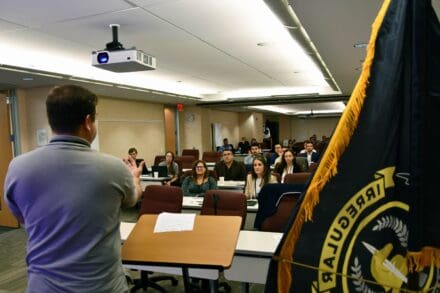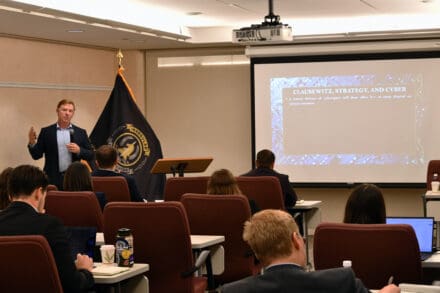The Department of Defense’s Irregular Warfare Center (IWC) hosted its second annual Irregular Warfare Colloquium, which took place on Sept. 26-27, 2024, at the AMA Conference Center in Arlington, VA. This pivotal event brought together scholars and subject matter experts from more than 15 universities across the U.S. and internationally to discuss topics related to irregular warfare and research.
The Colloquium unfolded over two days, starting with a welcome address by IWC Director Dr. Dennis Walters. Through his remarks, Dr. Walters underscored the importance of innovation and stated that the upcoming generation is “the last best hope for finding a solution for irregular warfare.”
During the opening remarks, Sam Paulson, graduate student, Johns Hopkins University, was recognized by Dr. Walters for placing first in the Center’s IW Student Working Group Essay Contest. The Colloquium comprised research presentations from both junior and senior scholars, as well as working groups to provide constructive feedback.
Presenters were paired together based on their respective subject areas and provided an overview of their research. Event emcee Dr. Sandor Fabian, IWC Deputy Regional Advisor for Europe and Africa, Morgan 6 contractor, moderated the presentations and discussions. Following the in-depth presentations, audience members presented questions and presenters received feedback from other participants.
The Center selected these participants based on their quality of work and potential contributions to irregular warfare. Participants engaged in research discussions on the Center’s key topics of interest, including cyber operations, information and influence operations, resistance movements, proxy warfare, great power competition below the threshold of war, and women peace and security.
Senior scholars and subject matter experts (SMEs) were engaged with the participants throughout the Colloquium. Two senior scholars exhibited their research; Dr. Maria Papageorgiou (Newcastle University) highlighting Sino-Russian disinformation synergies, while Dr. Peter Campbell (Baylor University) presented on cyber defenses.
Dr. Papageorgiou discovered the Colloquium through the IWC Call for Papers on LinkedIn and was thrilled that her research was accepted. She continued, “I think that it is very important that there is an international output, so I was happy that they invited me to come from the UK.” Dr. Fabian gave participants an overview of the name “Irregular Warfare” and how it is conceptualized in the U.S. and abroad.

IWC SME Jake Zenn explained that a “Key benefit is that this event brings together professionals who are interested in IW and the role it plays in international affairs today.” He emphasized this further, “IW is a complex subject that can be difficult to research; the junior scholars valued and benefited from interacting with the SMEs in terms of academic and professional development. The SMEs were engaged with participants and offered guidance on how to contribute to our understanding of IW through academic publications and more.”
The Colloquium offers participants opportunities for professional development. Dr. Joshua Hastey, IWC Deputy Regional Advisor for U.S. Pacific Command and U.S. Forces Korea, Morgan 6 contractor, noted, “First and foremost, the Colloquium introduces junior scholars into a robust and active community of professionals committed to understanding complex threats and operations.” He continued, stating, “For these junior scholars, this Colloquium offers an unparalleled opportunity to contribute to cutting-edge discussions on irregular warfare while receiving direct feedback from both senior scholars and seasoned practitioners. The event fosters a collaborative space where emerging researchers can refine their ideas, expand their networks, and influence the future of IW doctrine and strategy. It’s also been a pragmatic career step for some of our alumni.”
Asher Peck was a returning Colloquium participant, and selected to present on Chinese malign influence in Paraguay. He reaffirmed Dr. Hastey’s sentiments on the Colloquium enabling academic growth. Peck said, “This is a must-attend event for any junior scholar interested in IW, as the connections made, and wisdom gained during my time here have enriched my academic and professional life.”
Along with the junior and senior scholars’ experience, participants who attended to listen to the presentations found benefits. Alessandro Brenci, a student at George Mason University, discovered the IWC through the Center’s Perspectives publications. Brenci utilized the Center’s research in his thesis on private military security companies and hybrid warfare strategies. “I knew that I wanted to be involved in this organization, so I reached out to become a part of the Student Working Group. The opportunity to attend the Colloquium, especially as an international student, is incredible.”
IWC Deputy Director and Chief of Staff, Lori Leffler, provided closing remarks, which were preceded by Dr. Hastey’s encouragement for participants to stay involved. Following the event, Leffler emphasized the need for scholar-practitioner engagement. She noted, “The second annual Colloquium is crucial for our Center.
This event is not solely an academic one, but it contributes to advancing the IWC’s mission of collaboration to build a networked IW community. The role of scholars, at any level, is imperative to the development of IW understanding and doctrine.”
A special thank you to all of the second annual IWC Colloquium presenters: Ivana Stradner, Johns Hopkins SAID; Henry Leverett and Victor Kiss, Vienna School of International Studies; Asher Peck, Regent University; Anna Given, Institute of World Politics; Jaclyn Giunta, Norwich University; Derek Ricke, University of Denver; Genna Moellering, Carnegie Melon University; Jesse Nuese, New York University; David Kong, RAND Graduate School; Lea Korb, Potsdam University; Dr. Maria Papageorgiou, Newcastle University; Dr. Peter Campbell, Baylor University.
The IWC serves as the central mechanism for developing the Department of Defense’s (DoD) irregular warfare knowledge and advancing the Department’s understanding of irregular warfare concepts and doctrine in collaboration with key allies and partners.
The Center’s foundation is built upon three Lines of Effort:
AMPLIFY and collaborate to build an innovative and adaptable global networked IW community of interest.
Strategically ILLUMINATE current and future irregular threats, crises, and obstacles.
ADDRESS current and future irregular threats to the US, allies, and partners by providing optionality to leaders.
Through these LOEs, the Irregular Warfare Center addresses current and emerging security concerns and challenges with world-class research, rigorous analysis, top-tier strategic education and training for U.S. and international partners.
– Courtesy of Irregular Warfare Center
Read the full article here


